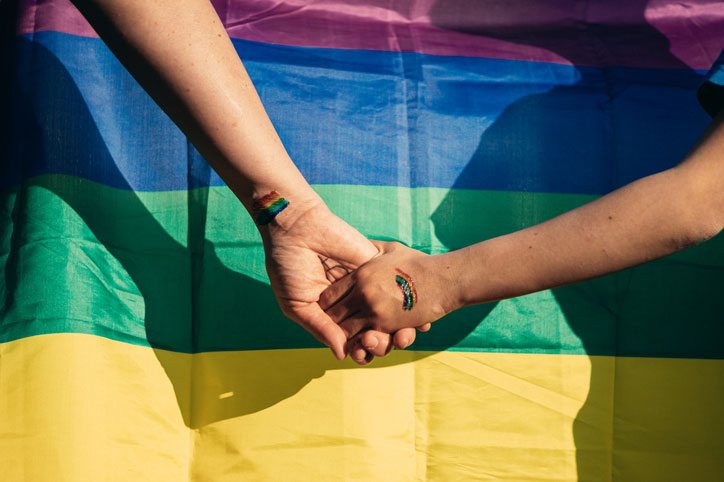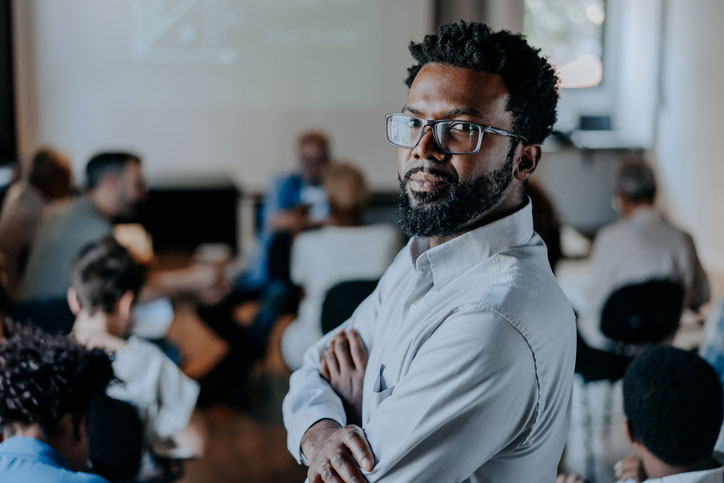Created by Illinois Social work EDU Contributing Writer

As a profession, social work is deeply rooted in social justice, equity, and human rights. Social workers specializing in racial and social justice particularly address LGTBQ+ rights, equity of Disabled individuals, and empowering marginalized groups. Intersectionality is the foundation of this specialty of social work. Race, class, age, gender, physical ability, and sexual orientation must be considered when determining forces of oppression and discrimination of marginalized groups and how to create inclusion and equity for all.
Social workers looking to expand their service in racial and social justice will find that Illinois is actively laying the groundwork for inclusivity. The Illinois Commission on Equity and Inclusion (CEI) was established in 2023 to aid the state’s workforce diversity and inclusion while expanding access to state contracts for women, persons of disabilities, veterans, and minorities. The CEI’s goal is to embrace diversity of identity, experiences, and thoughts, actively striving for inclusivity.
In recent years, the Illinois Department of Human Services (IDHS) has fostered racial equity through the program Healing Illinois. In conjunction with The Field Foundation of Illinois, Healing Illinois is distributing $4.5 million in grants to organizations across the state, facilitating equity work and racial healing activities.
Illinois’ active role in childhood equity supports the service goals of social workers as well.


Governor Pritzker established the Illinois Commission on Equitable Early Childhood Education and Care Funding, also known as the Early Childhood Funding Commission, with the objective of “building an early childhood landscape that is accessible, stable, and equitable.”
How to Pursue Racial and Social Justice Social Work in the Prairie State
A strong educational background and licensure are necessary first steps toward a racial and social justice career in social work for Illinois. Further specializations may influence career prospects.
Licensure
Illinois requires that social workers obtain a license. In Illinois, there are two levels of licensure: a Licensed Social Worker (LSW) and a Licensed Clinical Social Worker (LCSW). The National Association of Social Workers (NASW), Illinois chapter, can offer detailed information about the licensure process and application.
What is the difference between an LSW and an LCSW?
Both LSW and LCSW licensure can lead to a rewarding social work career. LSWs can typically work in most places that LCSWs can, but not necessarily in private practice. LCSWs usually require less clinical supervision than LSWs and can diagnose and treat mental disorders.
Education
To begin a career in racial and justice social work in Illinois, candidates must obtain a degree from an accredited institution. Applicants can find both Bachelor’s and Master’s of Social Work degree programs via the Council on Social Work Education (CSWE) in its directory of accredited programs.
Many social workers start with a Bachelor of Social Work (BSW). From there, either field hour requirements are met to earn an LSW licensure, or candidates continue their education with a Master of Social Work (MSW) with field experience to become an LCSW.
Some racial and social justice social workers find a bachelor’s degree in sociology, political science, or anthropology applicable to their goals and then continue their education with an MSW before earning their license.
Typically, a BSW requires four years to complete, and an MSW will take two years. Additional field experience hours may be required in combination with these degrees. Please review the requirements by the NASW.
What do Racial and Social Justice Social Workers Do?
While Illinois is making strides toward equity for all Illinoisans, more work still needs to be done with the help of qualified social workers. Those looking to focus on racial and social justice issues may find that concentrating their fieldwork on specific populations will bring them closer to helping the marginalized communities they hope to guide. LGTBQ+ advocacy and criminal justice reform are just a couple of areas where social workers can pursue social justice work. LSWs and LCSWs should consider how they can best serve their clients and communities. These are the five main ways racial and social justice social workers divide their expertise:
- Education
- Research
- Health Care
- Legal Advocacy
- Community Outreach

LGBTQIA2S+ (Lesbian, Gay, Bisexual, Transgender, Queer/ Questioning, Intersex, Asexual, Two-Spirited), also abbreviated as LGBTQ+ and LGBT+, encompasses a wide diversity of individuals who readily need the assistance of qualified social workers to navigate daily situations due to marginalization and violence they may experience because of their differences in gender and/or sexual orientation.
The NASW seeks to help LGBTQ+ people throughout their lives. Social workers are needed to advocate on behalf of LGBTQ+ individuals in the following ways:
- Health care needs, including gender affirmative care
- Mental health diagnosis and treatment
- Support for experiences of harassment and violence
- Law Enforcement interactions
- Homelessness resources
- Transportation funding
- Long-term trauma support
- Academic and school-related psychosocial challenges
- Workplace inclusion and professional development
- Legal aid resources
- Legislative changes and policy promotion
- Creating and maintaining LGBTQ+ community spaces
Homelessness Among the LGBTQ+ Community
Because they are at risk of losing family support, LGBTQ+ individuals often find themselves having to leave their homes non-voluntarily. According to Chapin Hall at the University of Chicago, LGBTQ+ young adults experience Homelessness at more than twice the rate of their peers. Qualified social workers can help these marginalized individuals find stable housing.
LGBTQ+ Youth
LGBTQ+ youth are disproportionately represented within populations that regularly work with social workers and human rights activists, including foster care and the juvenile justice system. Recently, the Illinois Collaboration on Youth partnered with The Human Rights Campaign Foundation’s All Children-All Families program to advance LGTBQ+ services in Illinois.
Youth in Care (YIC)
The Illinois Department of Children and Family Services (DCFS) is committed to making sure that all LGBTQ+ youth are treated with dignity and care. In 2003, Illinois’ DCFS was the first child welfare agency to create an LGBTQ+ service policy, and in 2017, further policy measures were put in place to protect transgender/gender-expansive youth. To supplement accommodations for LGBTQ+ YIC, Lawrence Hall, Illinois’ first LGBTQ+ exclusive foster home, opened up in 2023.
The improvements have been life-changing, but audits of Illinois’ DCFS have shown disparities in LGBTQ+ care. While the policies in place have been a good start, more qualified caseworkers are needed to ensure that service providers follow LGBTQ+ mandates. This is one area where racial and social justice social workers could be very beneficial.
Counseling
LGBTQ+ youth whose gender and sexual orientation are accepted and affirmed at home have lower rates of depression and suicide. Youth who do not have that support need community resources that social workers can provide. LGBTQ+ youth also face bullying, discrimination, harassment, and even violence at school and in the community. Qualified social workers can help with the diagnosis and treatment of mental health issues stemming from experienced trauma.
Access to Health care
LGBTQ+ individuals and their loved ones may encounter barriers to accessing health care, whether through discrimination by medical staff or insurance coverage issues regarding gender-affirming care. Social workers ensure equitable access to health care.
Resources
Social workers are on the frontlines of advocacy with the ability to provide resources to LGBTQ+ individuals. Here are some of the resources Illinois social workers regularly utilize for their clients:
- Center for Halstad
- Howard Brown Health
- Phoenix Center
- Youth Outlook
- The Brave Space Alliance
- Illinois Safe Schools Alliance
- PFLAG Springfield

Community Outreach for People of Color (POC)
Qualified social workers engage communities to promote equity for POC.
Community Organizing and Mobilization
Social workers engage POC communities to organize and mobilize with allies on immigration rights, environmental racism, economic justice, and police brutality.
Training and Education
By raising awareness about the impact of discrimination on POC, social workers can promote strategies for equity and inclusion. Qualified providers can educate on cultural competence, racial justice, and anti-oppressive tactics with other professionals.
Policy Research and Analysis
Documenting disparities is an important step toward advocating for POC. Social workers who delve into academic-driven research can collaborate with legislators and community leaders to create evidence-based solutions.
Criminal Justice Reform
Criminal justice reform is one area where social workers can lend their expertise and serve their community. People of Color (POC) and LGBTQ+ individuals are disproportionately represented in prison populations. Licensed providers work to document and advocate on behalf of these marginalized groups.
Much work needs to be done for minorities caught within the prison system. While Black Illinoisans make up 14.5 percent of the state’s population, they total 54.8 percent of the prison population, according to the American Civil Liberties Union (ACLU). Black Illinois residents were over seven times more likely to be incarcerated for cannabis before legalization. Historically, Transgender individuals have not been granted appropriate medical care within Chicago correctional facilities.
Policy Changes
Engaging in policy changes at the state level to develop and promote alternatives to incarceration and reduce recidivism is an important job for racial and social justice social workers. Qualified social workers often work with lawmakers and advocacy groups to sponsor change.
Education and Rehabilitation
Social workers work to develop and implement programs for incarcerated individuals and parolees. Mental health group therapy and substance abuse programs offer psychosocial support. Vocational training encourages skillsets necessary for successful re-entry into society.
Research and Evaluation
Studies are needed to assess the effectiveness of prison reform initiatives, ascertain areas for improvement, and create statistical analysis.
Assisting People with Disabilities
It can be difficult for People with Disabilities to know where to turn for guidance. This is another aspect of advocacy where social workers can positively impact others’ lives.
The Illinois Department of Employment Security (IDES) runs the Division of Rehabilitation Services. Both work in tandem with social workers to provide state resources for:
- Employment for People with Disabilities
- SSI and SSDI benefits planning
- Services for the Blind or Visually-impaired
The Chicago Mayor’s Office for People with Disabilities (MOPD) partners with social workers, community providers, and advocacy groups to facilitate the following resources:
- Independent living
- Deaf youth programs
- Housing and home modification
- Career Counseling
- Accessibility Compliance
- Accessible Events Calendar
2022 US Bureau of Labor Statistics job market trends and salary figures for child, family, and school social workers, healthcare social workers, mental health and substance abuse social workers, and social workers (all others) are based on national data, not school-specific information.
Conditions in your area may vary. Data accessed February 2024.
Discover more about other social work specializations in Illinois.





